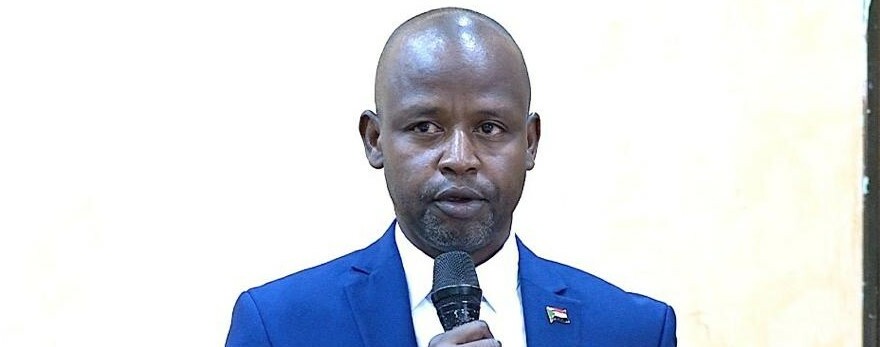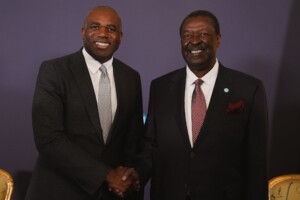Sudan ruler repeats rejection of Hamdok, Tagadom faction to sign charter in Nairobi

Rebel leader El Hadi Idris, chairman of the Sudan Revolutionary Front rebel alliance (File photo: Supplied)
Lt Gen Abdelfattah El Burhan, commander-in-chief of the Sudanese Armed Forces (SAF), and de facto leader of Sudan’s ruling junta yesterday denied that he has been communicating with the Forces of Freedom and Change (FFC) and stressed that “the Sudanese people will not accept that any government, Hamdok or anyone else, be imposed on them”. Today, the Tagadom faction chaired by El Hadi Idris will reportedly sign a political charter with Sudanese political groups and the Rapid Support Forces (RSF) in the Kenyan capital.
“We have no contact with any party except with the combatants [fighting the Rapid Support Forces],” he stated in his address to an e-learning conference in Port Sudan yesterday.
“We will not sit with them [the politicians] unless they return to the country and participate in the ongoing fighting,” he said and repeated that “We do not listen to anyone’s words, and we do not communicate with anyone.
Leaders of the mainstream Forces for Freedom and Change (FFC-Central Council) who joined the newly formed Sumoud alliance recently spoke in press statements about their continued communication with the army command to reach a peaceful way out of the ongoing war with the paramilitary RSF.
The FFC-CC was one of the driving powers behind the ousting of Omar Al Bashir in April 2019 and agreed with the military in August that year to form a civilian-led government, led by PM Abdalla Hamdok until the military coup of October 2022.
The Sumoud (meaning resilience in Arabic) coalition was announced on February 11, a day after the Tagadom alliance*, set up by the FFC-CC and other progressive Sudanese groups in October 2023, split into two camps over the formation of a government in exile.
“The internal division has been brewing for months as the coalition struggled to reconcile differing views on how to counter the legitimacy of the Sudanese Armed Forces (SAF)-led government in Port Sudan,” ,” Sudan War Monitor explained on February 12.
“Proponents of the government-in-exile proposal argued that a parallel civilian administration would provide a legitimate alternative to the junta, which has ruled Sudan since the 2021 coup. However, critics within Taqaddum [Tagadom, RD], including prominent and influential figures, warned that forming a rival government would fragment the opposition, undermine the coalition’s neutrality, and complicate diplomatic efforts to end the war.”
The newly formed Sumoud group chose Abdalla Hamdok as chair.
Not wanted
El Burhan yesterday further repeated his rejection of “external solutions”, pointing to the suggestion made by “certain countries” to have Hamdok return as prime minister.
“In a message to the African Union, the Horn of Africa Intergovernmental Authority for Development (IGAD), and the United Nations,” he said that “the Sudanese people will not accept that any government, Hamdok or anyone else, be imposed on them” and added that “whoever wants to rule Sudan should return to the country and fight with the Sudanese”.
The Sudanese-Sudanese dialogue meetings, called for by the African High-Level Mechanism on Sudan, are scheduled to start in the Ethiopian capital, Addis Ababa, in the coming days.
On February 8, El Burhan cautioned members of the dissolved National Congress Party (NCP), set up by the deposed Omar Al Bashir regime, as well as the Tagadom coalition, that they “will not return to power in Sudan”. The junta leader asserted that both groups “supported those [the RSF] who kill the Sudanese.” He also ruled out any peace negotiations between his government and the RSF.
Humanitarian conference
El Burhan also scorned the High-Level Humanitarian Conference on Sudan held in Addis Ababa on Friday at the initiative of the United Arab Emirates (UAE) and sponsored by the African Union, IGAD, and Ethiopia.
The junta leader said he considered the conference “an attempt to whitewash the positions of parties supporting the aggressors against the Sudanese people”, pointing to the UAE’s military support to the RSF.
He praised the unnamed countries that he said abstained from participating in the conference.
The conference was attended by the UN secretary-general of the United Nations, the chair of the African Union Commission, the Ethiopian prime minister and the Kenyan president. Abdalla Hamdok, chair of the Civil Democratic Alliance of Revolutionary Forces (Sumoud) also addressed the event that managed to raise $216 million for Sudanese displaced in Sudan and surrounding countries, with the UAE pledging $200 million, Ethiopia $15 million, and Gambia $1 million.
The conference was held on the sidelines of the 38th African Summit, where the issues of Sudan and Congo topped the agenda. At the conclusion of its work on Sunday, the summit called for a ceasefire in Sudan.
Government-in-exile
Today, the opposing Tagadom faction, chaired by El Hadi Idris, leader of the Sudan Liberation Movement-Transitional Council faction and head of the Sudan Revolutionary Front (SRF) rebel alliance, reportedly will sign “the charter of the Sudanese government to be formed” in the Kenyan capital of Nairobi.
Well-informed sources told Radio Dabanga on Sunday that “several delegations of political, civil and popular forces” had already arrived in Nairobi.
The faction of political forces and rebel movements, and the RSF supporting the group, have distributed invitations to journalists to participate in signing the political charter.
El Hadi said in an interview with Al Jazeera this weekend that they will not agree to any agenda that will divide Sudan. He pointed out that discussions on the details of forming the government have not begun, indicating that this will happen after the signing of the political charter and the completion of the founding constitution. “A number of countries and organisations have promised us to recognise the government that will be formed.”
A representative of the RSF leadership will sign the charter alongside a number of political forces and armed rebel movements. “The intended government will be announced inside Sudan after the charter is signed within Sudan. We saw that the charter should be signed abroad first to ensure international and regional presence.”
He explained that “the government to be formed is a government of peace and not a government of war. After forming the government, will set up a unified army to protect civilians”.
*Tagadom – The Civil Democratic Forces alliance, better known by its Arabic name Tagadom (meaning ‘progress’), was founded in the Ethiopian capital of Addis Ababa in October 2023, by members of the mainstream Forces for Freedom and Change (FFC-Central Council) and other Sudanese pro-democracy parties and groups. Former PM Abdalla Hamdok was elected chair. The Arab Socialist Ba’ath Party and the Communist Party of Sudan were not part of the alliance.
Tagadom aimed to build the “broadest democratic civil front possible” against the war between the Sudan Armed Forces (SAF) and the paramilitary Rapid Support Forces (RSF) that erupted in April that year. In December, Tagadom invited the commanders of the warring parties to discuss its roadmap to peace with them. RSF Commander Mohamed ‘Hemedti’ Dagalo responded to the call and signed the Addis Ababa Declaration with Tagadom on January 2. The SAF did not respond, but instead accused the alliance of siding with its enemy. In early April, the Sudanese Committee for RSF War Crimes and Violations in Port Sudan filed criminal charges against 17 Tagadom leaders.











 and then
and then